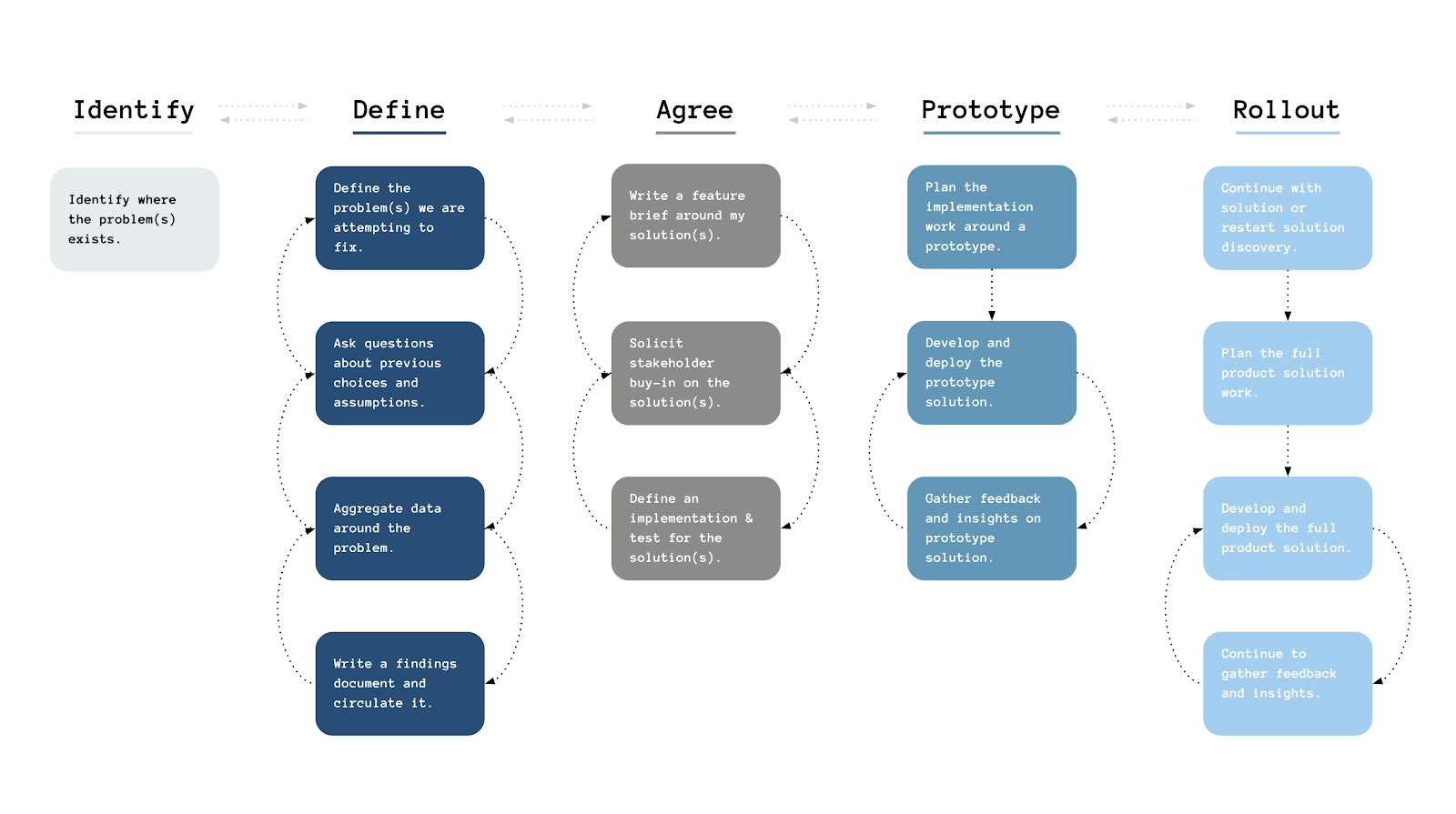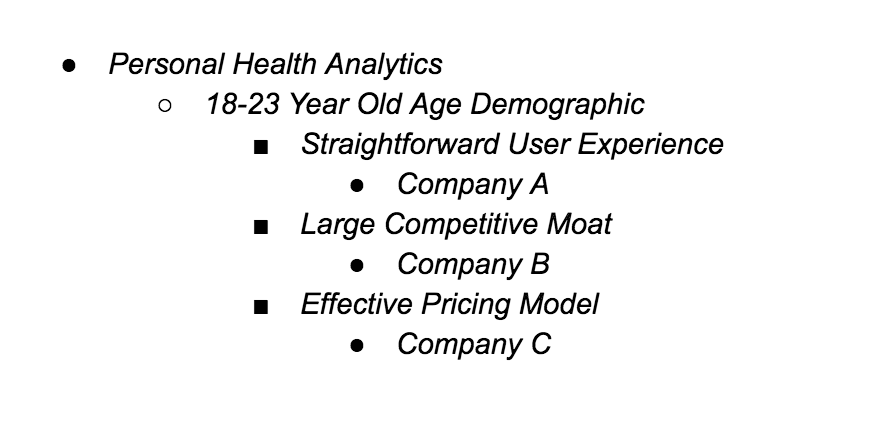Roadmaps are a great source of truth for a product, but there is an absence of roadmaps for the individual product managers. This is where a personal product philosophy comes in.
A personal product philosophy is defined as the core principles, beliefs, process, and attitudes a product manager has toward developing a product in general.
Every industry will have a different problem set, but a great product person should have a core philosophy they bring to the table to tackle an array of problems.
However, in my experience, most young product managers do not take the time to outline their product theories. In its absence, these product managers often lack a personal “north star” when things go sideways in their product delivery lifecycle. With the lack of a “north star,” a product manager is left with less understanding about where they stand on a product decision. As you can imagine, not having an opinion can be very costly for a product team as it can leave you in the bottom of a valley looking up.
This article will give you an outline on how to build your product philosophy, how you can blend it with others, and how to continually evolve it throughout your career. By crafting a clear philosophy and being open about yours with others, you will be able to build products methodically and objectively no matter what team you are on.
Building Your Philosophy
Write Out Your Product Experience: First, product managers come from all different backgrounds like I previously covered in my article about effective product managers. As a result, previous experience is what makes each product manager different. When shaping your product philosophy, it is essential to outline your personal experience working in Product. This outline will allow you to frame a clear picture of what you have completed, have not done related, and define your product related goals.
Some of my personal experiences include but are not limited to:
- I have worked on both major mobile platforms (iOS & Android).
- I have delivered six production-grade web applications.
- I have worked in consumer financial products, music, real estate, and ad-tech.
- I have worked in companies with one person all the way to 1200 people.
- I have worked on teams with 10+ engineers.
- I have managed teams five times in my career.
Outline Your Product Process: While all problems rely on a slightly modified process to be solved, I am a firm believer that every product person should have a process they default to when solving a new problem. A good way to outline your process is in steps. For reference, I am a research-heavy, writing-focused product manager who loves to front-load understanding to filter out potential solutions. Each problem will be met with an extensive brief. Each solution will always be tested via prototype to determine if we want to bring it to a greater audience.

In contrast, I have worked with product managers who love to dive into the problem set head first. They find it allows them to get much faster feedback around solutions that should be invalidated. They will use the prototype and A|B tests as the central source of truth similar to how I use the brief. While neither process is better than the other, one thing is for sure; complementary methods result in highly effective product teams.
Choose Your “Guiding Light(s)”: With the rise of product-driven companies, there is no shortage of software/hardware to look to when you lack an idea around a problem. I find it helpful to have a list of products that you turn to when you cannot come up with a novel solution for your product. When building this list, make sure to break it down by experience, customer persona, and industry. Sample “Guiding Light(s)”

Determine Your Critical Opinions: Critical opinions are the opinions for which you will die on a metaphorical hill in order to make sure they are heard. Since product managers are often the trusted opinion in regards to decision making, it is easy to be continually stating your opinion on things that are not important to you. As a result, if everything is important, then nothing is important to you. By understanding your critical opinions, you grant yourself the ability to understand that not all business outcomes are important to you.
Identify Your Gaps: Knowing your gaps in knowledge is equally as important as the knowledge you currently have. By determining your shortcomings, you can begin to learn if you need to fill the disparity or find a teammate that can help you fill it. It may not be the best allocation of time to fill in that information because of the product you’re working on may not need it. If not, just put it on your wish list and save it for a rainy day.
Blend Your Philosophy With Others: It is no mystery that you are not going to work and live in a philosophical echo chamber. Often you will be working with product managers who have entirely different philosophies. This is why it is important to find your philosophical overlap. Finding the overlap allows product managers to observe where they see eye-to-eye and where their beliefs can be complimentary. Now, the whole is greater than the sum of its parts as it relates to you and your product team. I believe a complimentary unit will always result in the best product outcomes. When blending, it is crucial that you remember to be malleable and that your philosophy is not sacred. There will be times when it is beneficial to abandon it and get on board with your colleagues.
Continue Evolving Your Philosophy
Your core philosophy is what makes you a product person. However, this does come with one major caveat: change. If you are stubborn and not open to change, you will become outdated and unaware. It is super important to remember that it needs to evolve over time. This will allow you to refine it and stay on top of the trends. Three easy ways to evolve are through colleagues, reading, and self-awareness.
Learning From Colleagues: As you begin to lengthen your career, learning from others becomes a large part of developing your product philosophy. It is natural and positive to adopt others’ philosophy into yours over time. This adoption helps build out a more robust philosophy with a perspective on different types of products.
Learning Through Reading: Reading has arguably been the most important part of evolving my product philosophy. Reading about other people in Product and their philosophies allows you to stay updated on the world in which you do not have direct access. I currently find weekly newsletters to be a good cadence for learning about new things in the Product space. I also believe that is important to read books orthogonal to product development. Some of my favorite topics to read about are Economics, Physics, and Finance. By reading, you give yourself an opportunity to try parts of other theories and see if they should be incorporated into your worldview.
Learning Through Awareness: As a part of evolving, you must remember to check in on the current state of your philosophy. This check-in is essential because it gives you dedicated time to determine if yours is working for you and your product career. If it is not working, then you should spend time identifying where it let you down or led to a suboptimal outcome.
While this will not instantly make you to the VP of Product at your company (or maybe it will), it will help elevate your mindset and allow you to think clearly through problems. With a solid core in hand, you will be able to tackle things you never thought were feasible. Like explaining to your friends & family what a product manager does.